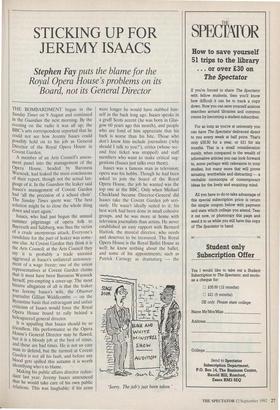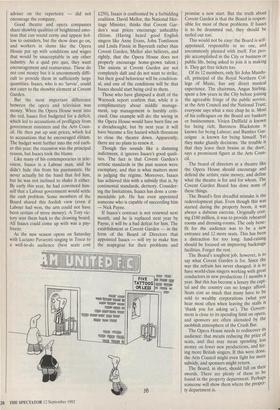STICKING UP FOR JEREMY ISAACS
Stephen Fay puts the blame for the
Royal Opera House's problems on its Board, not its General Director
THE BOMBARDMENT began in the Sunday Times on 9 August and continued in the Guardian the next morning. By the evening on the radio it was all up; the BBC's arts correspondent reported that he Could not see how Jeremy Isaacs could Possibly hold on to his job as General Director of the Royal Opera House in Covent Garden.
A member of an Arts Council's assess- ment panel into the management of the Opera House, headed by Baroness Warnock, had leaked the main conclusions of their report, though not the actual lan- guage of it. In the Guardian the leaker said Isaacs's management of Covent Garden had 'all the precision of a school choir'. The Sunday Times quote was: 'The best solution might be to close the whole thing down and start again.' Isaacs, who had just begun the annual summer pilgrimage of opera folk to Bayreuth and Salzburg, was thus the victim of a crude anonymous attack. Everyone's candidate for the part of leaker was some- one else. At Covent Garden they think it is the Arts Council; at the Arts Council they say it is probably a trade unionist aggrieved at Isaacs's unilateral announce- ment of a wage freeze; one of the union representatives at Covent Garden claims that it must have been Baroness Warnock herself, pre-empting a cover-up. The most bizarre allegation of all is that the leaker was Jeremy Isaacs's wife, the Observer Journalist Gillian Widdicombe — on the Byzantine basis that extravagant and unfair criticism of Isaacs would force the Royal Opera House board to rally behind a beleaguered general director.
It is appalling that Isaacs should be so friendless. His performance as the Opera House's General Director may be flawed, but it is a bloody job at the best of times, and these are bad times. He is not an easy man to defend, but the turmoil at Covent Garden is not all his fault, and before any blood gets spilled this autumn it is worth identifying who's to blame. Making his public affairs director redun- dant last year, Jeremy Isaacs announced that he would take care of his own public relations. This was laughable; if his arms - were longer he would have stabbed him- self in the back long ago. Isaacs speaks in a gruff Scots accent (he was born in Glas- gow 60 years ago this month), and people who are fond of him appreciate that his bark is worse than his bite. Those who don't know him include journalists ('why should I talk to you?'), critics (whose sec- ond free ticket was stopped) and staff members who want to make critical sug- gestions (Isaacs just talks over them).
Isaacs was a famous man in television; opera was his hobby. Though he had been asked to join the board of the Royal Opera House, the job he wanted was the top one at the BBC. Only when Michael Checkland became Director-General did Isaacs take the Covent Garden job seri- ously. He wasn't ideally suited to it; his best work had been done in small cohesive groups, and he was more at home with television journalists than artists. He never established an easy rapport with Bernard Haitink, the musical director, who needs and deserves to be treasured. The Royal Opera House is the Royal Ballet House as well; he knew nothing about the ballet, and some of his appointments, such as Patrick Carnegy as dramaturg — the 'Sorry. The job's just been taken.' adviser on the repertoire — did not encourage the company.
Good theatre and opera companies share showbiz qualities of heightened emo- tion that can sound corny and appear hol- low to outsiders, but the show does go on, and workers in slums like the Opera House put up with conditions and wages that would be unacceptable in any other industry. As a quid pro quo, they want encouragement and reassurance. These do not cost money but it is uncommonly diffi- cult to provide them in sufficiently large quantities. Isaacs, who is no `Itiwie', could not cater to the showbiz element at Covent Garden.
But the most important difference between the opera and television was money. When the Opera House went into the red, Isaacs first budgeted for a deficit, which led to accusations of profligacy from government ministers and the Arts Coun- cil. He then put up seat prices, which led to accusations that he encouraged elitism. The budget went further into the red earli- er this year: the recession was the principal reason, but Isaacs took the blame.
Like many of his contemporaries in tele- vision, Isaacs is a Labour man, and he didn't hide this from his paymasters. He never actually bit the hand that fed him, but he was not inclined to shake it either. By early this year, he had convinced him- self that a Labour government would settle the cash problem. Some members of the Board shared this foolish view (even if Labour had won, the arts could not have been certain of more money). A Tory vic- tory sent them back to the drawing board. All Isaacs could come up with was a pay- freeze.
As the new season opens on Saturday with Luciano Pavarotti singing in Tosca to a well-to-do audience (best seats cost
£250), Isaacs is confronted by a forbidding coalition. David Mellor, the National Her- itage Minister, thinks that Covent Gar- den's seat prices encourage unhealthy elitism. (Having heard good English singers like Anne Evans, John Tomlinson and Linda Finnie in Bayreuth rather than Covent Garden, Mellor also believes, and rightly, that the Opera House does not properly encourage home-grown talent.) The unions at Covent Garden are not completely daft and do not want to strike, but their good behaviour will be condition- al, and one of the conditions will be that Isaacs should start being civil to them.
Those who have glimpsed a draft of the Warnock report confirm that, while it is complimentary about middle manage- ment, top management is harshly criti- cised. One example will do: the wiring in the Opera House would have been fine on a dreadnought, but by next year it will have become a fire hazard which threatens to close the theatre down. Apparently, there are no plans to renew it.
Though this sounds like a damning indictment, it ignores Isaacs's good quali- ties. The fact is that Covent Garden's artistic standards in the past season were exemplary, and that is what matters most in judging the regime. Moreover, Isaacs has achieved this with a subsidy that is, by continental standards, derisory. Consider- ing the limitations, Isaacs has done a com- mendable job. He has even appointed someone who is capable of succeeding him — Nick Payne.
If Isaacs's contract is not renewed next month, and he is replaced next year by Payne, it will be a bad defeat for him. The establishment at Covent Garden — in the form of the Board of Directors that appointed Isaacs — will try to make him the scapegoat for their problems and promise a new start. But the truth about Covent Garden is that the Board is respon- sible for most of these problems. If Isaacs is to be drummed out, they should be turfed out too.
This would not be easy: the Board is self- appointed, responsible to no one, and uncommonly pleased with itself. For peo- ple accomplished in the City or business or public life, being asked to join it is making it. They get free tickets too.
Of its 12 members, only Sir John Mandu- ell, principal of the Royal Northern Col- lege of Music, has any direct musical experience. The chairman, Angus Stirling, spent a few years in the City before joining the agreeable fringe of the public service, at the Arts Council and the National Trust; everyone says what a nice chap he is. Most of his colleagues on the Board are bankers or businessmen. Vivien Duffield is known for being rich; Baroness Blackstone is known for being Labour; and Bamber Gas- coigne is known for being himself. Yet they make ghastly decisions: 'the trouble is that they leave their brains at the door,' says a prominent figure at the Arts Coun- cil.
The board of directors at a theatre like the Opera House should encourage and defend the artists; raise money; and define what the theatre is for and for whom. The Covent Garden Board has done none of these things.
The Board's first dreadful mistake is the redevelopment plan. Even though this was started during the property boom, it was always a dubious exercise. Originally cost- ing £180 million, it was to provide rehearsal rooms and dressing-rooms. The only bene- fit for the audience was to be a new entrance and 12 more seats. This has been a distraction for too long: fund-raising should be focused on improving backstage facilities. Forget the rest. The Board's toughest job, however, is to say what Covent Garden is for. Since the war the refrain has never changed: it is to have world-class singers working with great conductors in new productions 11 months a year. But this has become a luxury the capi- tal and the country can no longer afford. Seats cost so much that many have to be sold to wealthy corporations (what you hear most often when leaving the stalls is 'thank you for asking us'). The Govern- ment is close to its spending limit on opera, and sponsors are often alienated by the snobbish atmosphere of the Crush Bar. The Opera House needs to rediscover its audience: that means reducing the price of seats, and that may mean spending less money on fewer new productions, and hir- ing more British singers. If this were done, the Arts Council might even fight for more subsidy, and sponsors might return.
The Board, in short, should fall on their swords. There are plenty of these to be found in the property department. Perhaps someone will show them where the proper- ty department is.



































































 Previous page
Previous page